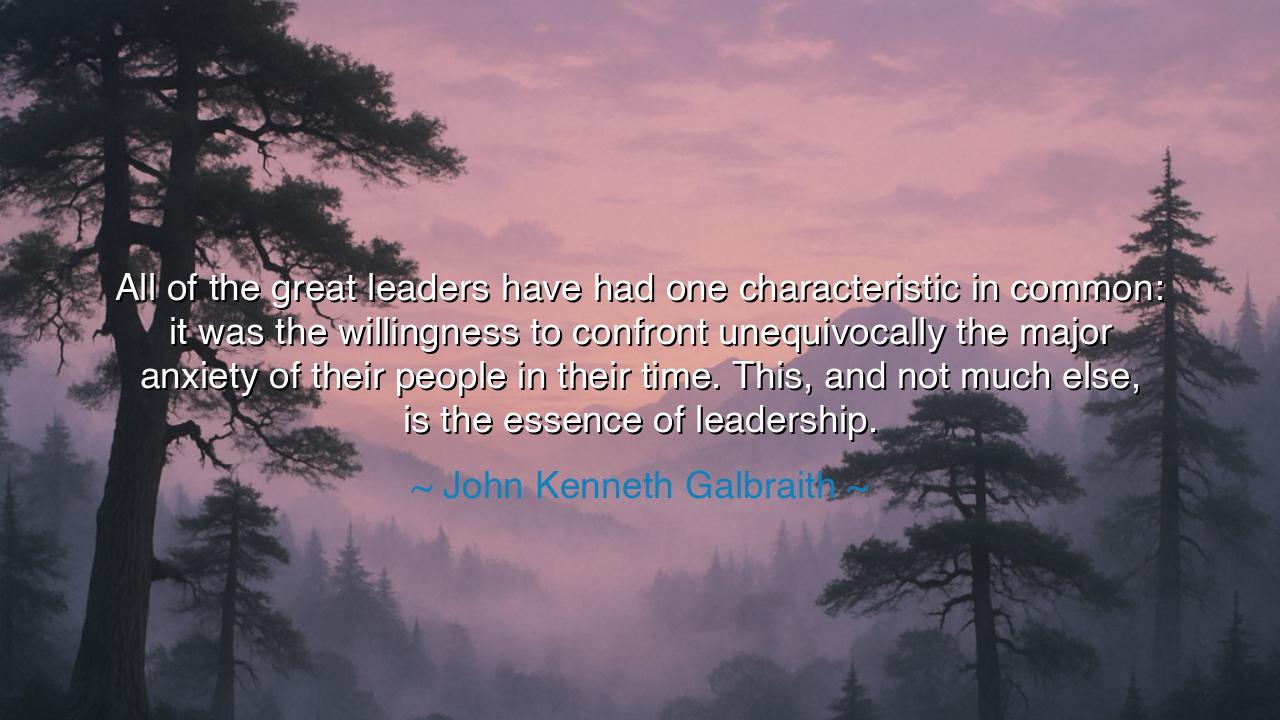
All of the great leaders have had one characteristic in common:
All of the great leaders have had one characteristic in common: it was the willingness to confront unequivocally the major anxiety of their people in their time. This, and not much else, is the essence of leadership.






Hear, O children of time, the words of John Kenneth Galbraith, the great economist and thinker, who declared: “All of the great leaders have had one characteristic in common: it was the willingness to confront unequivocally the major anxiety of their people in their time. This, and not much else, is the essence of leadership.” These words shine with a light that pierces through the illusions of false power. For leadership is not titles, nor the ornaments of authority, nor the empty clamor of words—it is the courage to face the deepest fears of one’s people and to stand against them like a shield.
What is this willingness Galbraith speaks of? It is the heart’s readiness to step where others shrink back, to speak when silence is easier, to take upon one’s shoulders the burden of a whole nation’s dread. Many can enjoy honor in times of ease, but the true measure of a leader is revealed when shadows loom and the people tremble. Willingness is not the absence of fear, but the strength to confront fear openly, refusing to disguise or diminish it, and choosing instead to face it with unwavering resolve.
And what is the major anxiety of the people? It shifts with the seasons of history. At times it has been war, at times famine, at times oppression, disease, or despair. The essence of leadership is not to invent greatness for its own sake, but to discern the greatest wound of the people’s heart in that moment and to answer it with vision, courage, and hope. One who ignores the true fear of his people is no leader but a pretender; but one who confronts it directly becomes a pillar of their survival and the architect of their destiny.
Consider the story of Winston Churchill in the days of the Second World War. The major anxiety of his people was clear: the shadow of Nazi domination, the terror of invasion, the despair of standing alone against a monstrous foe. Many voices sought compromise, to bow before the storm. But Churchill stood firm. He named the fear for what it was, confronted it with fiery words, and bore it with the people until it was broken. His leadership did not rest in genius strategy alone, but in his willingness to confront their deepest fear and to rally them with courage.
Or think of Abraham Lincoln in the time of America’s Civil War. The nation’s greatest anxiety was division and the sin of slavery tearing the republic apart. Lincoln did not hide from this wound, nor soothe the people with false comfort. He confronted it directly, naming it in his speeches, bearing it in his soul, and leading through it until the union was preserved and the enslaved were freed. His leadership was not born from the desire for personal glory, but from his willingness to wrestle openly with the greatest anxiety of his age.
Thus, Galbraith’s words are shown to be true: the essence of leadership is not adornment but confrontation—the bold facing of what terrifies the people most, and the guiding of them through the storm. Leaders who evade this calling are forgotten; leaders who embrace it are immortalized. It is not eloquence, wealth, or might that sets them apart, but the strength of spirit to stand where others falter, to confront the very thing that threatens the survival of their people.
The lesson for you, O listeners, is clear: if you would be a leader, seek not the comfort of honor or the applause of crowds, but discern the true need, the true fear, the true wound of those you serve. Do not turn away from it. Name it, face it, and carry it with them until it is overcome. For leadership is not about you—it is about the people entrusted to your care, and the storms they must survive.
Therefore, practice this: in your home, in your work, in your community, ask not how you may be praised, but what fear must be confronted. Step into it with courage. Speak truth without hesitation. Bear the weight of others with steadfastness. For in doing so, you embody the wisdom of Galbraith: that the essence of leadership is to confront the great anxieties of the people, and through that confrontation, to lead them into light.






AAdministratorAdministrator
Welcome, honored guests. Please leave a comment, we will respond soon